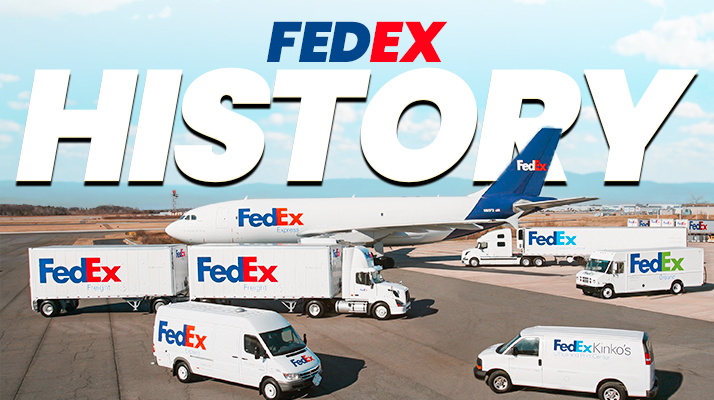The History of UPS United Parcel Service
The United Parcel Service (UPS) has become a household name in shipping and logistics, but its origins reveal a fascinating journey of growth and innovation, dating back to its founding as the American Messenger Service in Seattle.
From its humble beginnings to its status as a global leader, UPS has navigated numerous milestones that shaped the industry.
This article explores the company's founding, key historical developments, and its current operations, including the vast network and diverse services it offers.
Discover what sets UPS apart from its competitors and how its unique business model drives efficiency in delivery, supported by advanced technology investment.
Key Takeaways:
- UPS was founded on August 28, 1907, by James E. Casey and Claude Ryan, initially as the American Messenger Service in Seattle, Washington.
- Over the years, UPS has expanded globally, reaching over 220 countries and territories with a diverse client base and over 500,000 employees.
- UPS' success can be attributed to their efficient business model, strong community service values, and a company culture which prioritizes customer service and timely delivery.
1. The History of UPS
The history of the United Parcel Service (UPS) dates back to its humble beginnings in 1907 when James E. Casey and Claude Ryan founded the American Messenger Service in Seattle, Washington, marking the inception of a package delivery empire that would revolutionize logistics and establish a dominant presence in the transportation sector, utilizing brown trucks and innovative delivery vehicles. Over the decades, UPS expanded its services and operational facilities, evolving from a local messenger service into a global leader in package delivery, logistics, and e-commerce solutions, driven by a commitment to community service and operational efficiency.What is the Origin of UPS?
The origin of UPS can be traced back to 1907 when it was established as the American Messenger Service by James E. Casey and Claude Ryan in Seattle, Washington.Initially, the messenger service catered to local businesses, delivering messages and packages throughout the bustling city. With a focus on reliability and efficiency, this small operation quickly gained a loyal clientele, which included retailers and law offices seeking a dependable means of communication.
As the demand for package delivery services grew, the visionary founders recognized the potential for expansion beyond their initial geographic area, paving the way for their eventual growth strategy. Their ambition drove them to innovate, ensuring that UPS would not merely serve as a messenger service, but evolve into a comprehensive logistics provider.
Seattle played a pivotal role in shaping their plans, providing a gateway to emerging markets and allowing them to build a robust infrastructure for future growth. This foundation set the stage for what would eventually blossom into one of the world's largest delivery services.
When was UPS Founded?
UPS was officially founded on August 28, 1907, transforming the landscape of package delivery with its innovative approach to logistics and setting the foundation for a major logistics company.The origins of UPS can be traced back to two eager entrepreneurs who dreamed of revolutionizing the courier industry. Initially operating as a messenger service in Seattle, Washington, the company aimed to streamline the process of shipping, ensuring that goods could reach their destinations more efficiently than ever before.
Over the years, this commitment to service excellence set the foundation for what would become a global giant in the transportation sector, evolving from humble beginnings into a corporate powerhouse known for its reliability and extensive network.
As the demands of commerce changed, so too did the company’s vision—expanding services, embracing technology, and ultimately redefining logistics on a grand scale.
Who Founded UPS?
UPS was founded by two visionaries, James E. Casey and Claude Ryan, whose entrepreneurial spirit and innovative ideas laid the groundwork for what would become a global logistics company.In the early 1900s, both men recognized the growing need for a reliable delivery service amidst the bustling urban landscape of their time. Casey, initially a messenger, harnessed his experience to form the United Parcel Service in 1907, focusing on customer service and reliability. Meanwhile, Ryan brought his expertise in logistics to streamline operations, ensuring that packages reached their destinations efficiently.
Their collaborative efforts were pivotal in shaping the standards of the package delivery industry, and their commitment to excellence not only established a strong foundation for the company but also influenced future logistics practices and operational efficiency. Over the decades, UPS has evolved from a local messenger service to a global powerhouse, thanks to the innovative frameworks laid by these founders.
- James E. Casey - Founder and visionary leader
- Claude Ryan - Logistics expert and co-founder
2. How Did UPS Evolve Over Time?
UPS has undergone significant evolution since its inception, marked by key milestones that include the expansion of its delivery network through acquisitions and the diversification of services to meet the changing demands of a growing e-commerce landscape.What Were the Key Milestones in UPS' History?
Key milestones in UPS's history include the introduction of air freight services through UPS Airlines, the advent of 24-hour service, and the establishment of a robust delivery network that caters to a diverse range of industries.These pivotal moments have not only transformed the company’s logistics capabilities but also significantly enhanced customer satisfaction. For instance, the introduction of air freight services in the 1980s allowed for expedited shipping, which was crucial for businesses in an increasingly competitive market. With the rise of e-commerce, UPS adapted by implementing sophisticated tracking systems that improved package handling, ensuring timely deliveries.
- The launch of UPS My Choice in 2011 enableed consumers with more control over their deliveries.
- Innovations like advanced sorting technologies streamlined operations, leading to greater efficiency.
As UPS continues to evolve, its commitment to enhancing customer experience remains a central theme, underpinning its status as a leader in the logistics industry.
How Did UPS Expand Globally?
UPS's global expansion can be attributed to its strategic partnerships, innovative logistics solutions, and a commitment to providing exceptional international operations across various markets, supported by their corporate headquarters in Louisville, Kentucky.Through carefully orchestrated acquisitions, the company has been able to enhance its service offerings significantly while also penetrating new territories. By collaborating with local enterprises and leveraging strategic partnerships, UPS has tapped into regional expertise, which has been instrumental in tailoring services that meet specific market demands. This approach has allowed the logistics giant to:
- Streamline operations and reduce delivery times
- Enhance customer satisfaction through localized solutions
- Strengthen its overall presence in emerging markets
These strategies have not only bolstered its operational efficiency but also solidified its status as a leader in global logistics.
3. What is the Current State of UPS?
Today, UPS operates a comprehensive delivery network with thousands of locations worldwide, including UPS Stores and operational facilities, providing a wide range of shipping services, including options for e-commerce and health care logistics.How Many Locations Does UPS Have?
UPS operates over 80,000 locations worldwide, including its franchise network and operational facilities, which are crucial for its expansive delivery capabilities and support its global presence.The vast network comprised of UPS Stores, distribution centers, and logistical hubs, including its brown trucks and delivery vehicles, plays an instrumental role in facilitating timely deliveries and maintaining customer satisfaction. Each type of location serves a unique function:
- UPS Stores offer retail services such as shipping supplies, packaging, and drop-off options, making it convenient for customers to send and receive parcels.
- Distribution centers are strategically located to optimize the flow of packages, ensuring that items are sorted and dispatched efficiently based on destination.
- Logistical hubs handle a high volume of freight and are equipped to manage complex supply chains, further enhancing delivery speed and reliability.
By integrating these varied facilities into their delivery network, UPS ensures that packages reach their destinations seamlessly and on time, catering to the needs of both individual consumers and businesses alike.
Where Does UPS Ship?
UPS ships packages to over 220 countries and territories, making it one of the leading logistics companies for international operations in the parcel delivery industry. Their extensive reach enables businesses to connect with customers worldwide, ensuring timely and reliable deliveries regardless of location, and demonstrating its competitive edge in market competition. As companies expand into new markets, they rely on UPS's expertise to navigate the complexities of customs regulations and international shipping requirements.To better understand how UPS effectively manages its global shipping capabilities, it's important to note their robust logistics infrastructure, which includes advanced technology and operational efficiency, ensuring streamlined transport services.
- Advanced Technology: UPS utilizes cutting-edge technology for real-time tracking, enabling both businesses and consumers to monitor shipments at every stage.
- Comprehensive Service Options: The company offers a variety of delivery services, such as expedited shipping, freight services, and specialized solutions for e-commerce.
- Strategic Partnerships: Collaborations with local carriers enhance delivery efficiency and allow UPS to tap into regional expertise.
Key markets for UPS include North America, Europe, and Asia-Pacific, along with California and New York City, where they continuously adapt their services to meet evolving customer demands and cultural preferences.
What Services Does UPS Offer?
UPS offers a diverse range of services including package delivery through services like UPS Airlines, air freight service, and retail solutions through the UPS Store, a branch of United Parcel Service, catering to both individuals and businesses.Plus traditional mailing options, the company provides specialized solutions that meet the evolving needs of various sectors. For instance, UPS particularly excels in e-commerce logistics, a vital area for the American Messenger Service, offering tailored shipping services that help online retailers streamline their operations. This includes features such as:
- Real-time tracking: Customers can easily monitor their shipments.
- Flexible delivery options: Options like same-day and next-day deliveries cater to urgent needs.
- Efficient returns management: Simplifying the return process enhances customer satisfaction.
In the health care sector, UPS' logistics solutions are designed to ensure timely and secure delivery of sensitive medical supplies and pharmaceuticals, maintaining strict compliance with regulatory standards.
The UPS Store also plays a crucial role in the community by providing essential services like printing, packaging, and shipping solutions. By enhancing customer service with knowledgeable staff and convenient locations, it effectively builds strong relationships with local residents and businesses alike.
4. What Sets UPS Apart from Other Shipping Companies?
UPS distinguishes itself from other shipping companies through its innovative business model that prioritizes operational efficiency and technology investment, ensuring exceptional customer service and reliability.What is UPS' Business Model?
UPS's business model revolves around its extensive logistics network, competitive pricing, and strategic partnerships, which collectively drive its annual revenue and market competitiveness, reflected in its impressive market cap and annual revenue.This integrated approach enables the company to adapt swiftly to shifting market dynamics. By leveraging advanced technology and a sprawling transportation infrastructure, UPS enhances its service delivery, ensuring timely and reliable options for customers.
Their growth strategy emphasizes continual investment in logistics capabilities, thereby strengthening its position against rivals and catering to diverse consumer needs.
Through strategic partnerships with retailers and e-commerce giants, UPS maximizes efficiency and expands its reach.
The emphasis on sustainability initiatives illustrates a commitment not only to profitability but also to societal responsibility, making it a compelling choice in a competitive landscape.
How Does UPS Ensure Efficient Delivery?
UPS ensures efficient delivery through a sophisticated delivery network, including innovations like digital tracking that leverages advanced technology investment and streamlined package handling processes.By integrating cutting-edge software solutions and real-time tracking systems, the organization is able to optimize route planning and minimize delays. Its logistics framework, which includes strategically placed distribution centers, allows for quicker access to major markets.
- Investments in automation and sorting technologies enhance operational accuracy.
- The implementation of data analytics drives intelligent decision-making, ensuring packages are handled with care.
- Collaboration with local suppliers and partners streamlines the supply chain, fostering smoother operations.
These operational strengths collectively enable UPS to maintain a competitive edge in the logistics industry, ultimately ensuring customer satisfaction and timely deliveries.
What is the Company Culture at UPS?
The company culture at UPS emphasizes teamwork, community service initiatives supported by the Annie E. Casey Foundation, and employee engagement, fostering an environment where individuals are encouraged to contribute to both the company and the communities it serves.In this dynamic atmosphere, employees are not just resources; they are vital components of an overarching mission that prioritizes both operational efficiency and social responsibility.
Employee engagement initiatives, such as leadership development programs and open forums for feedback, enable individuals to share their ideas and drive positive changes. This culture of inclusivity is complemented by comprehensive community service programs that enable team members to give back, forging strong bonds among themselves while making a meaningful impact.
- Team Collaboration, which also involves contributions from individuals like James E. Casey and Claude Ryan: Working together on projects enhances creativity and innovation.
- Community Outreach: Employees regularly participate in local events, strengthening community ties.
- Professional Growth: Continued learning opportunities contribute to career advancement and satisfaction.
Ultimately, this holistic approach not only nurtures personal growth but also aligns with UPS's strategic goals, ensuring that all efforts resonate with the core values that define the organization.







